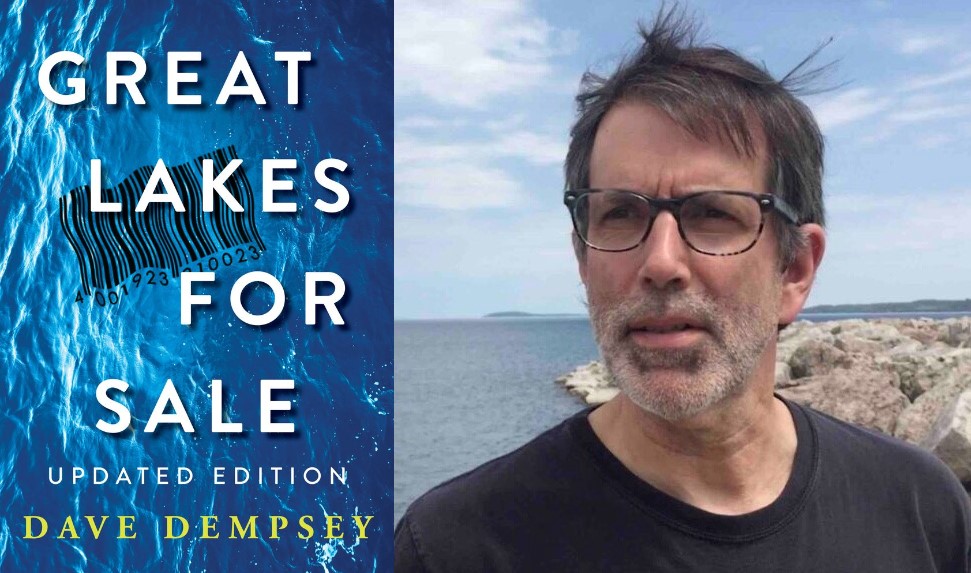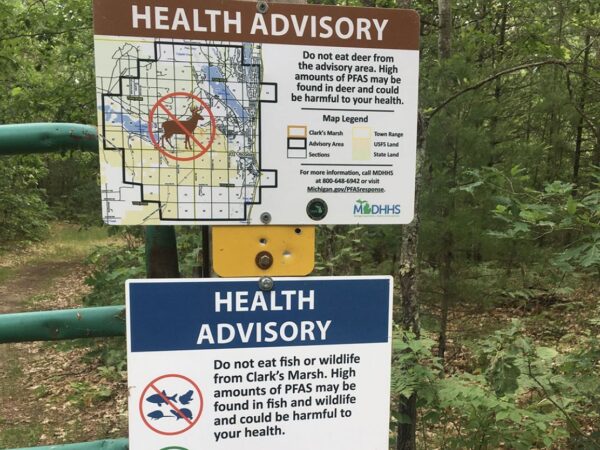
Tracking Michigan’s environmental issues has been a long, rewarding and at times arduous undertaking for Dave Dempsey.
He was an environment adviser to former Michigan Gov. James Blanchard in the 1980s and now provides policy advice to the Traverse City non-profit For Love of Water. In between were stops at the Michigan Environmental Council and the International Joint Commission.
During his career, there has been a consistent issue that garnered Dempsey’s attention: the threat of water diversions from the Great Lakes.
It should be no surprise then that the subject of his new book, his sixth on the Great Lakes, is Great Lakes For Sale, Updated Edition. It’s the successor to his 2006 book of the same name.
The updated edition provides historical context for the diversion issue and chronicles the region’s internal water wars over bottled water and the role it plays in diversions. It also illuminates new threats based on the prolonged drought in the American West.
Great Lakes Now’s Gary Wilson talked with Dempsey about the status of the Great Lakes Compact, the agreement between the eight Great Lakes states crafted to prevent diversions. He fears that the current class of governors, including Michigan Gov. Gretchen Whitmer, sees the diversion threat as a settled issue, and the emerging threat of treating water as a commodity to be traded for profit.
The interview was conducted by phone and recorded, transcribed and edited for length and clarity.
Great Lakes Now: The book chronicles proposals to ship Great Lakes water westward going back decades including a pipeline to Wyoming in 1986 that gained traction before it was quashed. The Great Lakes Compact signed by President George W. Bush in 2008 was heralded as the antidote to large scale diversions. Some said it provides “ironclad protections.” Is that the case?
Dave Dempsey: No, there are no ironclad protections. I would say that the Compact probably will prevent long-range diversions for a decade or more. This actually has more to do with economics, it’s prohibitively expensive to build structures to take water out of the Great Lakes basin.
But close one door for now and another one opens, and that’s the commercialization threat. There is language in the Compact that the Great Lakes states have more or less said water is a product, at least in small containers, and I think that precedent has put us in danger. We’ve been exporting water via Nestle and its successor, and we are diverting water in Wisconsin.
GLN: Concerning groundwater and its use for bottled water, you document in the early 2000s how two Michigan governors, a Republican and a Democrat, took action that for the first time “sanctioned the export of water out of a watershed for sale.” The water wasn’t coming from the Great Lakes. Why the concern?
DD: Groundwater generally in Michigan feeds the Great Lakes. If you took a pipe and stuck it in Lake Michigan and withdrew tens of millions of gallons a year and shipped it out of the basin people would be outraged.
People would see it and it would be a visible symbol of the withdrawal. Obviously when you pull it out of a spring that feeds a river it’s a lot less obvious to see, but it has the same ultimate effect. In fact, it has a greater local effect than if you stuck the pipeline in Lake Michigan. Pulling water out of a spring has, as we’ve seen with the Nestle case, impacts on river flow and fisheries.
So, it’s a matter of where it comes from that impedes the public understanding of what the threat is. Somewhere between 20 and 40% of the volume of the Great Lakes begins as groundwater so it’s a major contributor to the lakes.
GLN: Since the Compact became law, approved diversions have been small scale along a narrow corridor of Wisconsin bordering the basin divide. Strident supporters of the Compact dismiss them saying the Compact was enacted to prevent large-scale diversions to far-off regions. Why are you concerned with Wisconsin?
DD: I’m concerned because the premise of the Compact’s provisions for in-state diversions was they would be used to protect public health. In the case of Waukesha, everyone knew it was coming while the Compact was being negotiated. And it was supposedly because the city had a water supply contaminated with radium and they needed to replace the supply source. And that turned out to be a legitimate rationale, although not for the volume that Waukesha wanted.
But these other diversions had nothing to do with public health. They’re all about fertilizing urban sprawl as the Racine-Foxconn diversion illustrates. That leaves us vulnerable to assertions by other states that the Great Lakes states use spare water for out of watershed uses, that we’re not husbanding that water for health concerns. We’re allowing it as an economic development tool, and that’s a problem.
It’s also a betrayal of the commitment made by the states that they would not use this newfound exception for reasons other than public health, and Wisconsin has. Wisconsin’s not the land of lakes anymore, it’s the land of diversions.
GLN: When running a not-for-profit, former President Obama’s Great Lakes adviser Cameron Davis and others downplayed the bottled water issue and the small-scale diversions in the interest of securing passage of the Compact. Now he’s advocating for an update. You talked to Davis for the book. Why the change?
DD: What Davis has told me is that he’s hearing a lot of talk about water as a commodity now. Certainly the new trading and California water futures on the Chicago Mercantile Exchange caught his attention. It’s caught my attention.
We’re potentially headed into a future where water becomes viewed as a commodity. People bet on water prices. We know from economics that the more scarce something is, the higher the price. It’s a concern, and I think the Compact left us open for treatment of Great Lakes water as a commodity in several ways, including the product and bottled water loophole.
GLN: Are you concerned that a water futures market could take hold?
DD: Very much so. I think the experience we’ve had in the last 12 years since the Compact passed is that the long-running drought in the west has created a consciousness there that freshwater is going to need to be found someplace.
Whether or not we see long-range diversions, I think we will see betting on water prices here in the Great Lakes region and proposals to take water out of the Great Lakes. Obviously we can’t have freighters of Great Lakes water going out but could well have freighters of Great Lakes water in containers going out at least in the short run. I worry about the Compact’s durability in the long run.
GLN: The Great Lakes governors who pushed for the Compact and their immediate successors are out of office. The governors who won in the 2018 election – Whitmer in Michigan and Evers in Wisconsin, for example – have not shown an interest in it. Is there a mindset that the big water diversion threat is settled because the region has the Compact?
DD: Yes, the governors and to some extent the constituent groups who pushed the Compact have moved on to other things. I think it’s time, as Cameron Davis said, to start thinking about Compact 2.0, and no one is doing that.
As I say in the book, it’s a good time to start thinking about the humanitarian exemption in the Compact for water diversions. We don’t have an idea of what the humanitarian needs might be, but there’s an increasing possibility that Great Lakes water might be needed on a short-term basis for that. The Compact needs to be revisited, and the governors need to move it up their priority list.
GLN: Have any of the groups that have traditionally monitored the Compact been in touch with Gov. Whitmer’s office or any of the Great Lakes governors about this issue?
DD: No, not to my knowledge.
GLN: Should they be?
DD: Yes, they should. The environmental community especially should be the visionaries on this issue. I recognize that we all have a lot of other crises including the very serious one in Benton Harbor to focus on, but we can’t neglect the Compact as a regional priority.
Catch more news on Great Lakes Now:
Great Lakes Water Diversions Could Be More Numerous
Great Lakes mayors and First Nation group at odds with governors on water diversions
Featured image: Dave Dempsey and the cover of his new book, “Great Lakes for Sale”




